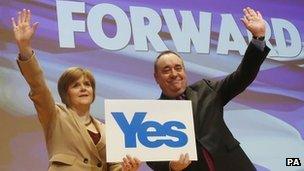Scottish independence: 'Transition plan' outlined
- Published
- comments

Alex Salmond and his government claim Scotland can be independent in March 2016
The Scottish government has outlined a possible transition to independence in the event of a "Yes" vote in the autumn 2014 referendum.
Independence day for Scotland would be in March 2016, with the first elections to an independent parliament in May.
First Minister Alex Salmond said the timescale was in line with previous international experience.
UK ministers said the SNP was failing to make the case for independence and focussing too much on "process".
The Scottish government wants to ask voters the yes/no question, "Should Scotland be an independent country", in autumn 2014, although it has yet to name the actual date.
A 16-page document published by SNP ministers, external has set out a possible transition from a "Yes" vote in the referendum to independence day in March 2016.
It came before the UK government next week publishes an analysis on the impact of independence.
The Scottish government paper envisages ministers joining other parties and civic groups to negotiate the terms of independence with the UK government, which would see the division of assets and liabilities, new global connections - including the EU - and Scotland's retention of the monarchy.
There would then be a written Scottish constitution, "which reflects the values of the people of Scotland", according to the document.
Mr Salmond urged UK ministers to agree to joint talks on the process surrounding the referendum result, as recommended by the Electoral Commission watchdog.
The first minister told BBC Scotland: "30 countries have gone through the process of having a referendum and then becoming independent.
"The average timescale for these 30 countries since the Second World War is 15 months - we've actually allowed a bit longer than that in the process."
Turning to those campaigning to keep the Union, Mr Salmond said: "The question they've got to answer is, if 30 other countries managed to do it, then why couldn't Scotland?"
The first minister said his government was setting out a range of proposals ahead of a substantive White Paper on independence, due towards the end of the year.
He said: "The 'No' side seem to think we're not doing anything until November - I think they've been taken a bit by surprise by the amount of work that we've been doing.
"We're putting forward what we think is the best future for Scotland, the best way to do it. We're putting forward how the processes will unveil.
"The 'No' campaign seem to think their role is to stamp their feet and say, 'you cannae do it'. Well, yes we can."
For the UK government, Scottish Secretary Michael Moore said it was already setting out views on the post-referendum process.
Mr Moore said: "The Scottish government should be concentrating on the substantive issues of the independence debate, rather than endless distractions over process.
"Once again, they are devoting their energy to the picture-frame when they don't have a painting to put in it.
"We haven't even got a date for the referendum, let alone any detail on what independence would mean for people in areas like the economy, welfare, energy and financial services."
The Scottish secretary added: "People in Scotland appreciate the benefits of remaining part of the United Kingdom family and that is why they remain strongly opposed to independence."
Deputy Prime Minister Nick Clegg, speaking in the Commons, said the UK government's "dispassionate analysis" of the impact of Scottish independence would be a "powerful addition" to the debate, and the first in a series of papers on the issue.